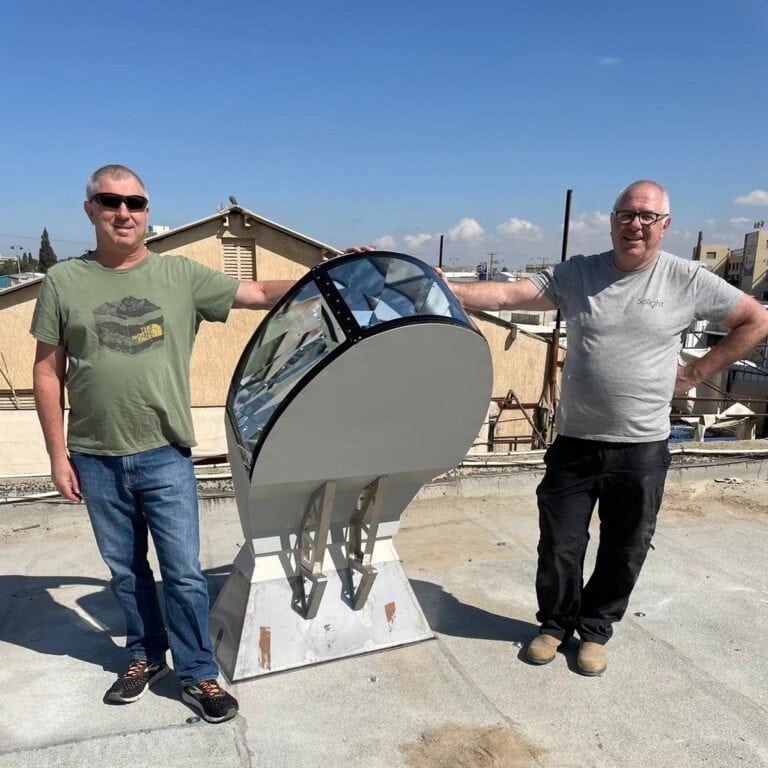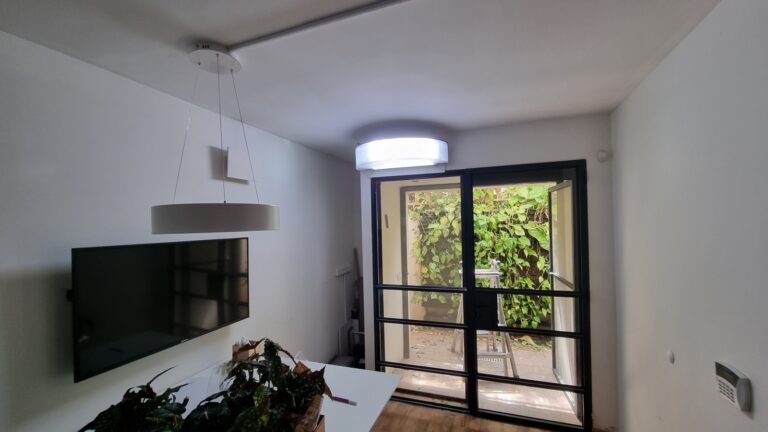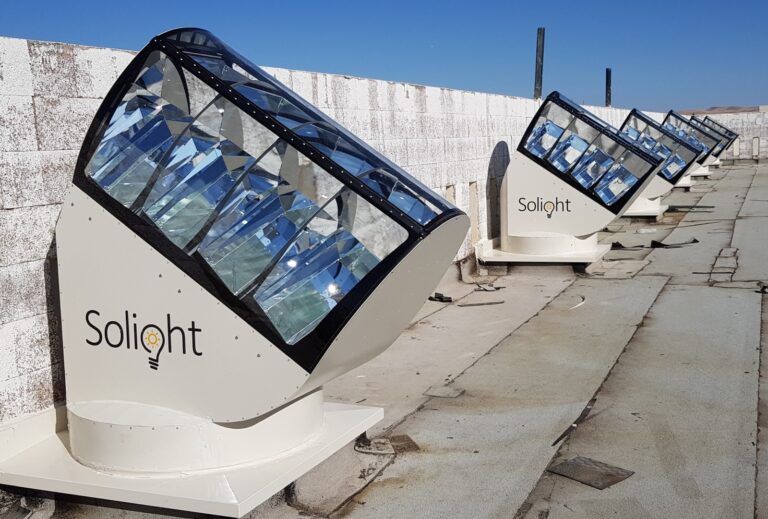
Bringing Sunlight Indoors for Better Health
Brian Blum via Israel21c – Solight collects natural light and directs it through a series of tubes to illuminate the indoors through holes in the tube or light fixtures.
“Human beings are out of sync,” says Ofer Becker, CTO of Haifa-based startup Solight.
Indeed, because most of us in the Western world spend so much time indoors, we’ve lost our connection to natural sunlight.
And that can lead to health problems, from a lack of healing Vitamin D to a lack of sleep-facilitating melatonin.
The body’s circadian rhythm – the biological clock that regulates the sleep/wake cycle and much more – is also highly affected by sunlight exposure.
Spending more time outdoors is the simple answer, but that’s not so easy when you work 9-5 in an office.
That’s the issue Becker and his Solight cofounder, his brother and company CEO Dror Becker, set out to solve with Solight.
The company’s technology collects natural sunlight from outdoors and directs it through a series of tubes indoors, where it can illuminate a room through holes in the tube or light fixtures attached to those openings.

There are financial savings, of course – if you can light a home or office with natural sunlight, you use less electricity – but the real benefit, Becker tells ISRAEL21c, has to do with health.
Stronger than a drug
In one Korean research study Becker cited, natural sunlight increased the recovery time of hospital patients by an average of 30 percent. Hospitalizations were 8% shorter after orthopedic surgery, 18% less after pediatric surgery, and nearly 10% less after urological, ophthalmologic or dental surgery.
Sleep is critical to healing and sunlight plays perhaps the deciding factor.
“Natural sunlight is stronger than any kind of drug to cure insomnia,” Becker explains, citing data from the Good Light Group.
Just 20 minutes outside in strong sunlight near the end of the day can make a huge difference. Proper lighting can also improve mood, increase concentration and, in general, synchronize one’s internal biological clock with the outside environment.
Becker points to research showing that worker productivity increases up to 18% when buildings have more natural lighting. Retail sales have been shown to jump by 25% when lighting is improved. A Cornell study found that letting natural light into hospital nurses’ workstations had a measurably positive effect on alertness and mood.
A 1999 study by the Heschong Mahone Group reported that “daylighting” elementary schools resulted in a 20% faster progression by students in math and 25% faster progression in reading.
A periscope approach
To bring natural sunlight indoors, Solight has adopted a relatively low-tech approach. Other than the solar collector, the SOLIS system has no moving parts or electronics and requires little or no maintenance.
Solight’s first focus is on commercial installations — offices, factories, school and hospitals up to five stories tall. Because Solight’s process requires hands-on, third-party installation for each customer, “high-rise buildings require too many modifications,” Becker explains.

While Solight has integrated its technology into some new buildings, retrofitting existing infrastructure makes up the lion’s share of the market.
Upfront design and consultation can be done in less than a day, Becker adds. Solight’s components can be mixed and matched like LEGO bricks, so installation can be as quick as three hours.
Solight first puts a collector on a rooftop or southern façade. The collector is then attached to a “light guide” – a reflective tube in which light travels in real time.
“It’s similar to the periscope in a submarine,” Becker explains. “Light comes in the top, travels through an optical system, and leaves via the bottom. We do not store or transform the light.”
Paying customers
Launched in 2012, Solight devoted the first six years to perfecting its technology. Now it’s actively supplying natural sunlight solutions to clients in Israel, plus a couple of projects under development in India.
Paying customers include Israel Railways, which has installed Solight’s technology in its Beersheva depot; the four-year-old Kedma hotel in Sde Boker in Israel’s Negev desert; the Technion – Israel Institute of Technology and the Bazan refinery, both in Haifa; a preschool in Ramat Gan; the Arava Agri-Research Institute in Ein Yahav; the Eilat municipality’s education network; and Kfar Saba’s recycling and sustainability center. Soon, the system will be installed in 10 buildings in Tel Aviv that are being refurbished.

All told, Solight has 23 systems installed in Israel, although the company is not at a mass production level yet.
It currently costs around $10,000 for a Solight system to be installed for a commercial building. Becker is working to slash that figure in half.
Sunshine on a cloudy day
There are other companies working on channeling natural sunlight indoors – Becker cites Velux and SolaTube, both of which are “doing fantastic work. However, our system is more efficient by a factor of three for direct sunlight and a factor of four to five when there are clouds.”
While other systems can cease operating when conditions are cloudy or hazy, he adds, “We remain proportional. If we have half the sunlight on a cloudy day, you still get half the sunlight inside.”
On days when some artificial light is necessary, Solight suggests that customers make up the difference using dimmer switches or a smart-home system (such as those from Apple and Amazon) to add the proper amount of indoor lighting.
Despite Solight’s ability to shuttle light from outside to inside, little heat is generated. At the Kedma, Becker explains, the indoor temperature rose two to three degrees, which can be easily compensated for by air conditioning.

How much natural sunlight does one need? Direct sunlight has the power of 100,000 lux, Becker points out. That’s way too much for indoors, where only 500 lux is recommended by The Good Light Group.
Solight uses indirect reflection towards, say, a ceiling to bring down the intensity. Dispersing the light over a wider area will also reduce its strength.
Doing business during a war
Solight has raised money from the Israel Innovation Authority, the European Union’s Horizon 2020 program and private investors. The Israeli ministries of the environment and energy have chipped in support, as well.
Since October 7, however, the sun has not shone as brightly for Solight, which is based in the Haifa district on Tirat Hacarmel.
Overseas investment in Israeli startups has plummeted since the war against Hamas in Gaza began. The money the company raised in 2021 has run out.
“We had to let some people go, even though all of our recent projects have been profitable with a nice margin,” says Becker.
Only the Becker brothers remain on payroll – and not even that, as Ofer has spent 120 days over the past seven months in the IDF reserves and has been called up for another two months.
But meanwhile, recognition of the importance of natural sunlight is growing. The European Union has issued guidelines for how much outside lighting new buildings must support. Becker says that could reach up to 30% of all buildings in Europe by 2030.
“The 20 or so installations we’ve done are just a drop in the bucket of potential,” Becker says. Even Apple has added light measuring abilities to its latest Watch.
While the future may be bright, for now at least, Becker says, “We just have to survive long enough.”
For more information, click here.
To read the original article click here.






